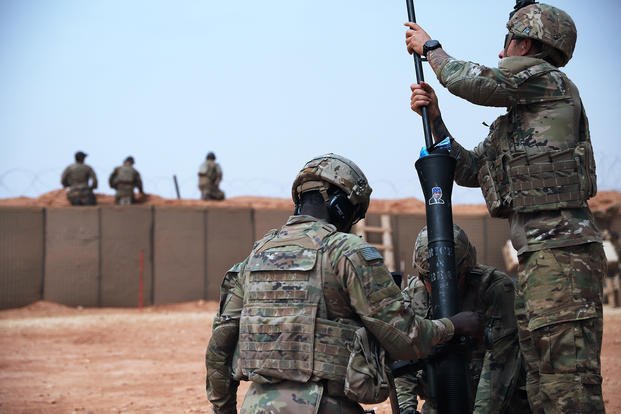More than 20 U.S. troops stationed across the Middle East were injured in drone and rocket attacks last week, with most suffering traumatic brain injuries, according to defense officials.
The Pentagon confirmed late Wednesday that 21 U.S. personnel received "minor injuries" due to the attacks at al Asad Airbase in Iraq and the al-Tanf Garrison in Syria, which occurred between Oct. 17 and Oct. 18. Of those injuries, 19 were diagnosed as traumatic brain injury, or TBI, a defense official told Military.com on Thursday.
The escalation in drone and rocket attacks on bases with U.S. troops comes after Israel began its war campaign against Hamas -- a terror group that launched a sudden and brazen terrorist attack on the country on Oct. 7 that has killed about 1,400 Israelis.
Read Next: Maine Manhunt Underway for Army Reservist Suspected in Deadly Shooting Rampage
On Monday, the Pentagon blamed the attacks on Iran and groups it supports in the region, and said it expected the threat to grow as the bloody war in Israel and Gaza drags on.
Of the TBI cases, 15 occurred at al-Tanf and four were at al Asad. The defense official said that since then, all the service members had returned to duty.
Earlier media reports had reported figures of 24 or 30 injured personnel.
The news comes on the heels of an announcement earlier this week by the Pentagon's top spokesman, Brig. Gen. Pat Ryder, that between Oct. 17 and Oct. 24, U.S. bases in the region endured 13 attacks -- 10 separate attacks on bases in Iraq and three attacks in Syria.
Ryder said the attacks were "a mix of one-way attack drones and rockets."
In response, the Pentagon announced Tuesday that it was sending air defense batteries to the region from Fort Bliss in Texas, Fort Liberty in North Carolina and Fort Sill in Oklahoma. The units include a Terminal High Altitude Area Defense, or THAAD, battery as well as several Patriot missile battalions.
A senior defense official, who spoke to reporters Monday about the regional fallout from Israel's bloody war with Hamas, said they "see a prospect for much more significant escalation against U.S. forces and personnel in the near term and, let's be clear about it, the road leads back to Iran."
Meanwhile, troops at the bases enduring the missile and drone strikes are not only at risk now but for years to come, as well. While TBIs -- also called concussions -- have become a much more common injury in the last several decades in part due to weapons and tactics that have led to troops experiencing and surviving more close-quarters blasts, the long-term health effects are still being studied.
Military.com has extensively reported on the topic and found that one of the most dramatic results of the injury is a significant rise in the likelihood of suicide, a problem the military has grappled with for years but found little success in decreasing the number of deaths.
Defense officials stressed that "in some cases, service members may report injuries such as TBI several days after attacks occur, so numbers may change."
-- Konstantin Toropin can be reached at konstantin.toropin@military.com. Follow him on X at @ktoropin.
Related: Army Air Defense Units from 3 Bases Are Deploying to Middle East After 13 Drone Attacks












